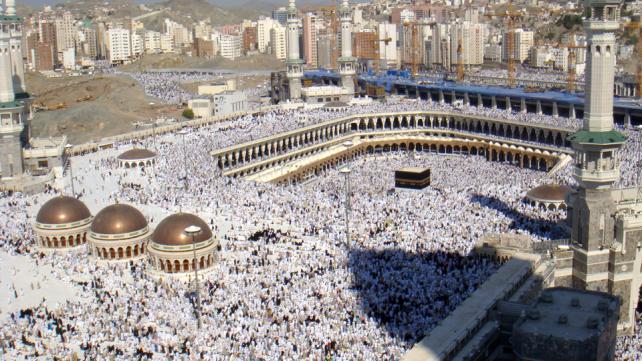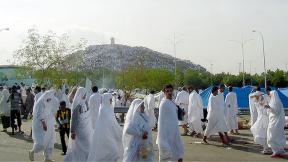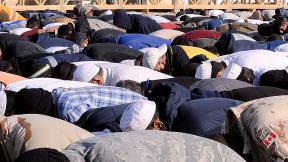
Hajj is the fifth pillar of Islam, and is required of every Muslim who is both physically and financially able to complete it. But there are many questions regarding the pilgrimage, some of which we hope to answer here:
Q: What is Hajj? What is its significance?
A: Hajj is a religious duty for Muslims, one that must be performed at least once in the life of every Muslim who is able to complete it. A reflection of the solidarity and unity of the Muslim Ummah, Hajj is the largest, most impressive spiritual pilgrimage in history.
When one performs Hajj—assuming they do so correctly—the Prophet said they will return from Hajj without sin and purified.
It has been narrated from Aba Abdillah (peace be upon him) that, "Hajj is of two types: Hajj for the sake of Allah and Hajj for the sake of people. A person who performs Hajj for Allah, surely his reward will be with Allah - Paradise; and a person who performs Hajj for people, surely his reward will be with people (to give him) on the Day of Resurrection."
Q: Do all Muslims have to perform Hajj?
A: Yes. However, there are certain factors to take into consideration.
First, only Muslim adults (whether male or female) are required to perform Hajj. This means that, while children may go to Hajj, it is not required of them. Maturity and an ability to understand the magnitude of the pilgrimage are needed to fully take advantage of the experience. A sound mind and full control of one’s mental capacities are required to perform Hajj.
Second, the Muslim has to be physically able to undergo the amount of travel and have the strength to perform the pilgrimage. Very weak, sick, elderly, or otherwise physically incapable Muslims are exempt from having to perform the pilgrimage.
Third, the Muslim must be financially able to perform Hajj. The expenses for the pilgrimage are not little, so every Muslim that goes must be free of debt and able to bear the costs.
Q: What is the significance of the first 10 Days of the month Hajj (called Dhul Hijjah)?
A: The Messenger of Allah said that the first 10 days of Zil Hajj are a special time of devotion and worship. This is when most of the Hajj pilgrimage rituals are performed. The first 10 days are also when the significant Day of Arafat (on the 9th day) occurs. The 10th day of Hajj marks the Eid Al-Adha holiday, the more significant of the two Islamic holidays.
Q: How much preparation is needed before I go on my Hajj trip?
A: As much as possible! Most people spend at least a month before any normal trip just preparing, shopping, planning, etc. But this isn’t your average trip to Disneyworld; Hajj is the most important trip you will ever go on throughout your life. Extensive planning is highly recommended. We suggest two to three months before your flight date, at least.
There is both religious and practical preparation required. For Hajj, there is obviously more to it than just grabbing a Hajj handbook (https://www.soundvision.com/book/a-handbook-of-umra-hajj), booking a flight, and going.
Hajj is the journey of a lifetime, so make sure you’re going with the right intention: to please Allah and nobody else. Study the Fiqh of Hajj before going (there are often classes or workshops offered at the local Masjid). Get books, DVDs, audio CDs, whatever it takes.
You should also take care to follow all of the policies and procedures implemented by the government of Saudi Arabia, like how to get a Hajj visa, joining a Hajj group, transportation, housing, etc.
Don’t forget to discuss with your boss about vacation time. Hajj will require about three to four weeks off. Talk to your employer(s) or anyone else who needs to know you’ll be out of town for a month.
Read our “8 Tips On Preparing For Hajj Now” page for more details.
Q: What do Muslims at Hajj wear?
A: Men wear the Ihram, two unstitched white cloths. Women can wear whatever they usually wear in prayer, so long as it is Islamically appropriate. Many choose to wear a simple jilbab.
Read about the obligations and prohibitions of Ihram.
Q: What are the Hajj rituals?
A: There are too many to get into detail here. Read the rituals of Hajj and Umrah here:
Q: Is Hajj very physically taxing? How much physical preparation is needed?
A: Hajj requires a lot of walking. Expect three million people and easily more to also be there. As such, you should make sure you’re strong enough to handle yourself in that type of crowd. (Many people build up their stamina by establishing an exercise routine in the weeks and even months leading up to Hajj.) To be at optimum health, you may also want to consult your doctor about any shots or broad-spectrum antibiotics he or she recommends you take before your trip.
Women & Hajj
Q: Can a woman in Ihram wear socks or jewelry during Hajj?
A: It is permissible.
Q: Can a woman cover her face in Hajj?
A: It is agreed by scholars that a woman should not cover her face (or wear gloves for that matter) during Hajj. The Prophet said, “The Muhrimah (a woman in Ihram) should not cover her face, nor should she wear gloves.” If a woman is in need of covering her face (i.e. if she fears the gaze of non-Mahram men on her) then it is permissible for her to cover her face.
Q: Does a woman need a Mahram to travel to Hajj?
A: There are different rulings from the four Madhhabs (schools of Islamic thought) regarding women traveling to Hajj with or without a Mahram.
- Shafi Maddhab: Hajj is not obligatory upon a woman until she finds a male Mahram relative or husband, or group of trusted women with whom she can perform the journey securely. If she finds any of the three, Hajj is obligatory on her. However, it is permissible for her to travel alone to Hajj if she shall be safe and fears nothing on the road (referencing a Hadith from the Prophet).
- Maliki Madhhab: Similar to the Shafii Maddhab. The Madhhab’s opinion is that a woman who cannot find a Mahram or husband to travel with can make the journey with a secure group, whether the group is a group of men, women, or a mix of both men and women.
- Hanbali Madhhab: If a woman cannot find a husband or male relative to travel with, she cannot go to Hajj and it is not obligatory on her.
- Hanafi Madhhab: Similar to the Hanbali Madhhab.
Q: Anything else I should know about Hajj?
A: We recommend you be familiar with all of the Hajj terminology and places. See our complete list here: (http://www.soundvision.com/hajj)








Comments
Tent
Assalamu alaikum,
I am planning on going for hajj this year inshaAllah and have already started the preparations. I have a package which includes the tent in mina, but i also bought a bagpack tent for myself and my wife. My question is that is it okay for me to take my own tent and set it at mina and not reside in the provided tent. I just want to know if it is allowed by the government of Saudi Arabia, if yes, Is there a place where I can set up my camp?
Thank you
Location
About Haj
What if a haji performs Tawafulwwida but stayed there for few more days and visited haram repeatedly?
Location
Add new comment